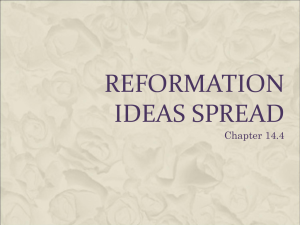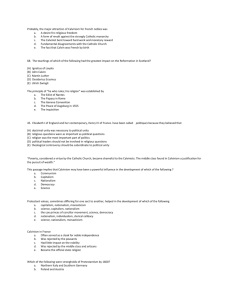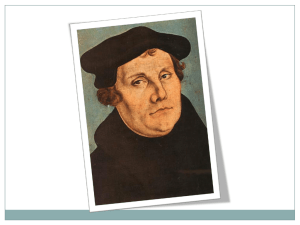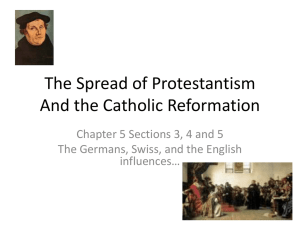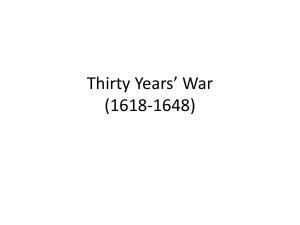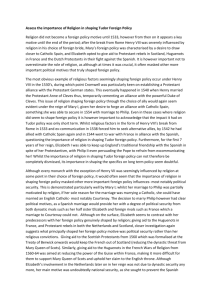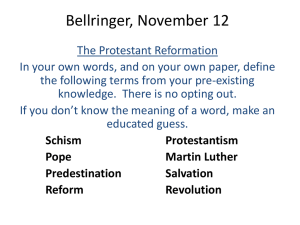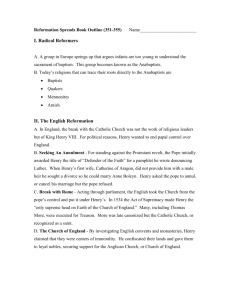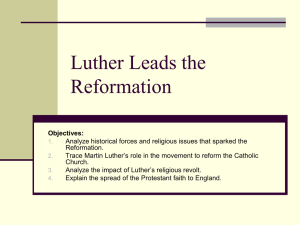Reformation Ideas Spread
advertisement
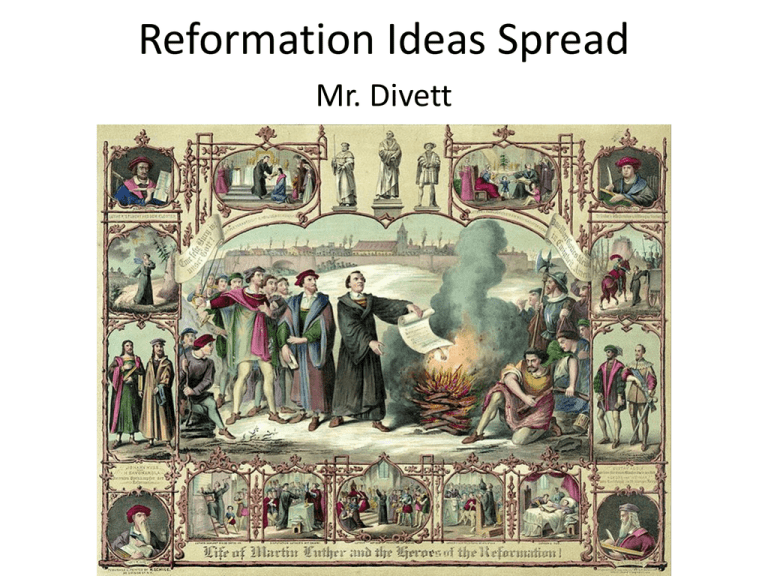
Reformation Ideas Spread Mr. Divett Martin Luther Martin Luther • • • • • Wrote the 95 Theses Condemned the selling of indulgences Started an revolt against the Catholic church Translated the Bible into German Wanted all to have equal access to God and the Bible John Calvin John Calvin • French born • Published a book explaining his belief • The book also outlined how to start and run a Protestant church • Preached predestination • Calvin was asked to a religious community in Geneva • It was a theocracy, a government run by church leaders Ulrich Zwingli Ulrich Zwingli • Stressed importance of the Bible • Rejected elaborate church rituals • From the Swiss city of Zurich The Spread of Reformation • The Catholic church fought back against the Protestants • They wanted to keep the church unified • They wanted to stop the spread of Protestant ideas • The Protestant movement carried on An Explosion of Protestant Sects • Hundred of Protestant sects started • A sect is a religious group • Most sects followed in the teachings of Luther, Calvin, and Zwingli • Many sects adopted even more radical beliefs • Those who rejected infant baptism were known as Anabaptists Anabaptists • Some Anabaptist sects sought after social change • This included: – The abolishment of private property – Violence to speed up God’s day of judgment – Anabaptist once over took Munster, Germany (against the wishes of Luther) Here is where the dead bodies of the Anabaptist leaders were displayed. The cages still hang from St. Lambert’s Church in Munster, Germany Peaceful Anabaptists • Not all Anabaptists were violent • These modern-day sects trace their religious ancestry to the Anabaptists: – Baptists – Mennonites – Amish English Reformation • Henry VIII was a loyal Catholic and opposed the Protestant revolt • That was until he wanted an annulment and the pope said no Henry VIII • Henry VIII had been married to Catharine of Aragon for 18 years • They only had a daughter together, Mary Tudor • Henry quit the Catholic church and started his own so he could get an annulment and marry Anne Boleyn • He hoped that she would have a son • Thomas Cranmer was appointed archbishop and annulled Henry VIII’s marriage • Henry and Anne have another daughter, Elizabeth • Act of Supremacy – Passed 1534 by Parliament – King was supreme head of the church • Catholics did not like this • Those who stood up to it were executed • Sir Thomas More used to work for Henry but resigned • He was later canonized, or made a saint • Anne then has three miscarriages • Henry has her tried for treason and beheaded • Henry then marries Jane Seymour – She finally has him a son, Edward VI – She dies two weeks later • Henry keeps marrying… Growth of the Church of England • The church of England (now the Anglican church) practiced most of the same forms of worship as the Catholic church • Henry started shutting down Catholic churches and seizing their property Edward VI • Henry VIII died in 1547 • Edward VI took the throne – He was nine – He was a devout Protestant – He died at age 15 Mary Tudor • Half sister to Edward VI • She took over when he died (against Edwards wishes) • Wanted the country to return to Catholic faith Elizabeth I • Mary died in 1558 • Elizabeth took over • Elizabeth made a compromise: – England would keep a lot of Catholic traditions – The Church of England hierarchy would remain – She would not be the divine ruler • England avoided religious war The Catholic Reformation • Pope Paul III wanted to reassert Catholic authority and power • 1530s and 1540s • The pope called the Council of Trent: – Met off and on for 20 years starting in 1545 – Reaffirmed Catholic doctrine – Provided harsh penalties for corruption in clergy Inquisition Revisited • The pope strengthened the Inquisition: – It used torture to strengthen the church – It weeded out the heretics – It forbade books, including books by Luther and Calvin Jesuits • • • • Established 1540 Strict Catholics Helped combat heresy Left a legacy behind – The majority of Europe remained Catholic in 1600 Persecution • Both Catholics and Protestants were intolerant • Witch hunts- tens of thousands died between 1450 and 1750 as victims of witch hunts • Jews were expelled to live in ghettos or separate parts of the city
